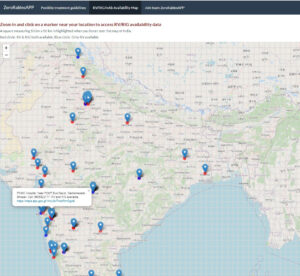As a veterinarian in rural India, Aniruddha Belsare witnessed firsthand the plight of rabies. He watched in horror as teenagers bit by rabid dogs failed to receive the necessary lifesaving treatment.
Over the years, Belsare, now an assistant professor of disease ecology within Auburn’s College of Forestry, Wildlife and Environment (CFWE), shifted his focus from practicing veterinary medicine to studying infectious diseases of animals. His project topics include chronic wasting disease in North American deer populations and others that have implications for public health and conservation.
But along the way, he fixated on the needless rabies deaths he struggled to prevent in India, and one day he determined to take matters into his own hands.
“I realized this will keep on happening unless and until getting these medications becomes easier,” Belsare said.
In 2021, Belsare began developing an application called ZeroRabiesApp that provides critical information about dog-bite treatment and also tracks the availability of lifesaving medications in developing countries, such as India and Nigeria. In a recent preprint publication, Belsare and his international collaborators outline their strategy for preventing human rabies deaths through their interactive web application.

Auburn Assistant Professor Aniruddha Belsare has developed an application called ZeroRabiesApp that provides critical information and tracks the availability of life-saving medications.
THE WRATH OF RABIES
Rabies is one of the deadliest and yet most preventable diseases in the world. After being bit by an animal carrying the rabies virus, people are nearly guaranteed to die within a few days. But those who receive the proper post-exposure treatment promptly always recover to full health.
In the U.S. and much of the Western world, responsible pet ownership, pet dog vaccination and access to post-exposure treatment have made rabies deaths nearly obsolete.
But the story is very different in many African and Asian countries, where large stray dog populations are largely unvaccinated and rabies treatments are much less accessible. In India, someone dies from dog-mediated rabies roughly every 30 minutes.
“These are 100% preventable deaths,” Belsare said. “Something has to be done to save lives today.”
AUBURN JOINS THE FIGHT
As a cross-disciplinary researcher at Auburn, Belsare is working to fill both of these gaps. His ZeroRabiesApp sources current post-bite treatment guidelines directly from the World Health Organization and Center for Disease Control to offer a clear, customized treatment plan based on the time of exposure.
With the help of nonprofits and citizen scientists, the app features a database of rabies biologics available in pharmacies and health care facilities across the country. The crowdsourced approach relies on volunteers to contribute the rabies biologics availability information through an online portal.
“The hope is to build upon this app to inform efficient rabies control strategies,” Belsare said, and he aims to bring in undergraduate and graduate students to help him with this larger initiative.
(Written by Ecotone Science Writing and Photography)









